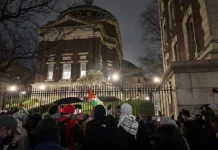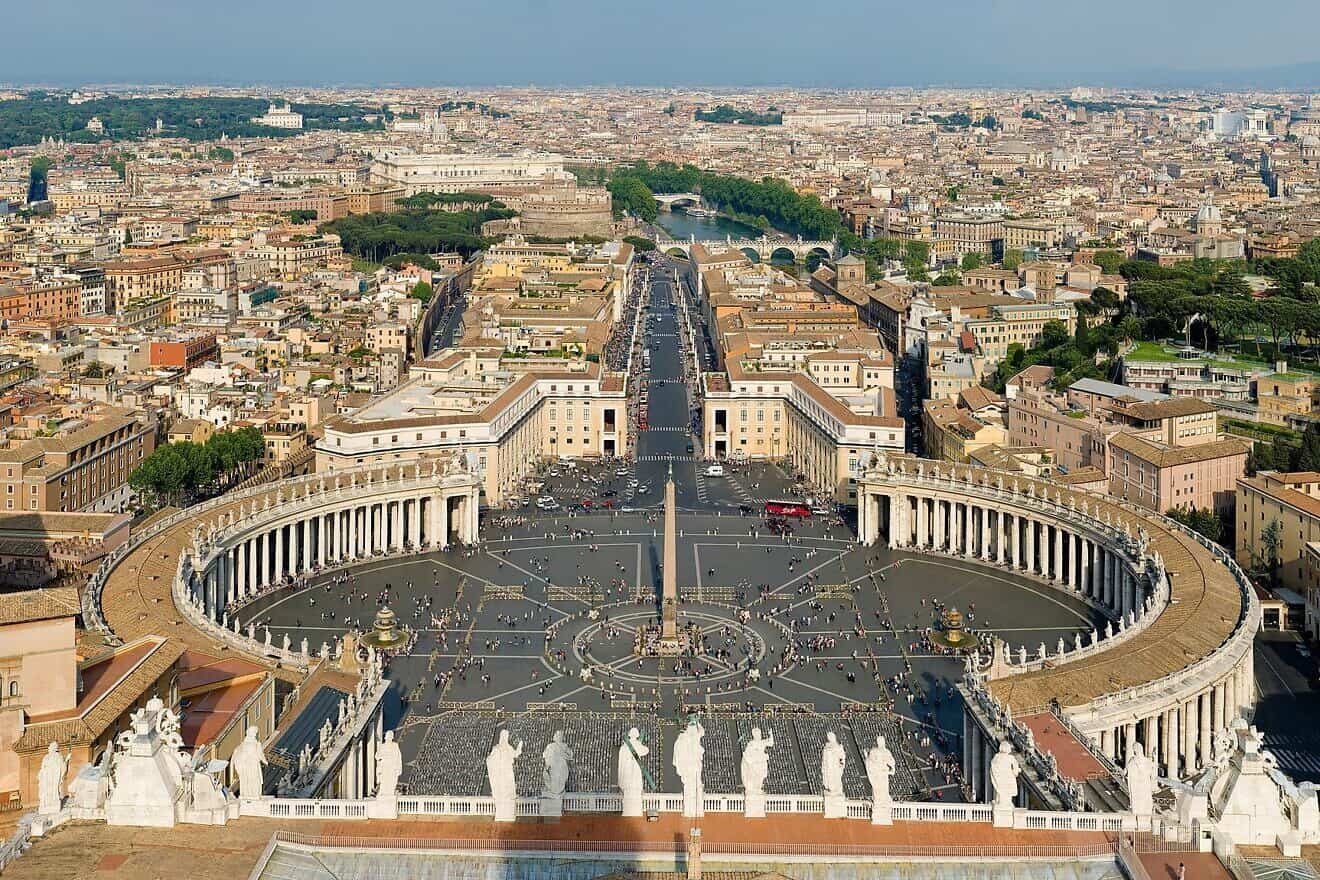I am currently at the Vatican with Gary Krupp of the “Pave the Way Foundation” to engage with high-ranking Catholic leaders. Krupp has spent his life building bridges between the church, the Jewish community and Israel. On this occasion, my mission is clear: to persuade the church to formally recognize Israel as the biblical birthright of the Jewish people. This visit, occurring amid ongoing global debates about Israel’s legitimacy, reflects my longstanding commitment to bridging Jewish and Christian theological perspectives while staunchly defending Israel’s historical and spiritual claims.
During this trip, we met with Cardinal Pietro Parolin, the Vatican’s secretary of state and one of the most influential figures in the global Catholic Church, and Archbishop Paul Richard Gallagher, the Vatican’s global foreign minister and, similarly, one of the church’s most influential leaders. Both men are possessed of the warmth, humility, scholarship and professionalism that is characteristic of the Vatican’s highest leadership.
Our meetings lasted many hours. With Pope Francis in the hospital, we began with prayers that I recited for the pontiff from the book of Psalms. Then, I focused on Israel’s significance in biblical history and its modern existence as a Jewish homeland. I argued that such recognition could strengthen ties between the church and the Jewish community, aligning with his broader goal of fostering interfaith understanding.
I stated my case at the Vatican, urging the Holy Father to affirm Israel’s status as the eternal homeland of the Jewish people. Prior meetings with Pope Francis in 2016 and Pope Benedict XVI in 2010, both arranged with Krupp, afforded me experience in papal engagement.
These discussions come at a pivotal moment as antisemitism and anti-Israel sentiment continue to rise globally. I published the book Kosher Jesus, in 2012, where I appealed to Christian moral authority to bolster Israel’s legitimacy on the world stage.
The question of whether the Catholic Church should recognize Israel as the eternal inheritance of the Jewish people is deeply rooted in biblical theology, historical promises and the enduring relationship between God and His chosen people. Both the Old and New Testaments provide a compelling case for affirming the Jewish people’s historical and perpetual connection to the Land of Israel. While the Catholic Church has historically approached this issue with caution—emphasizing a spiritual rather than political interpretation of biblical promises—there are strong scriptural and theological reasons for the church to formally acknowledge Israel as the eternal inheritance of the Jewish people.
The cornerstone of this argument lies in the covenant God made with Abraham. In Genesis 12:1-3, God calls Abraham to leave his homeland, promising to make him a great nation and to bless all peoples through him. This covenant is expanded in Genesis 13:14-17, where God declares, “Lift up your eyes and look from the place where you are, northward and southward and eastward and westward, for all the land that you see I will give to you and to your offspring forever.”
The term “forever” (olam in Hebrew), underscores the eternal nature of this promise, explicitly tying the land—later identified as Canaan, encompassing modern Israel—to Abraham’s descendants, the Jewish people.
This promise is reiterated in Genesis 15:18-21, where God specifies the geographical boundaries of the land, from the river of Egypt to the Euphrates, and in Genesis 17:7-8, where He affirms, “I will establish my covenant as an everlasting covenant between me and you and your descendants after you for the generations to come, to be your God and the God of your descendants after you. The whole land of Canaan, where you now reside as a foreigner, I will give as an everlasting possession to you and your descendants after you.” The repetition of “everlasting” in these sentences reinforces that this is not a temporary grant but a Divine commitment transcending time.
The promise to Abraham is not a one-off declaration. It is reaffirmed through his son Isaac and grandson Jacob (renamed Israel). In Genesis 26:3-4, God tells Isaac, “Stay in this land for a while, and I will be with you and will bless you. For to you and your descendants, I will give all these lands and will confirm the oath I swore to your father Abraham.”
Similarly, in Genesis 35:11-12, God says to Jacob, “I am God Almighty … The land I gave to Abraham and Isaac, I also give to you, and I will give this land to your descendants after you.” The continuity of this promise across generations solidifies the Jewish people’s claim to the land as an eternal inheritance, rooted in their identity as the children of Israel.
The covenant at Sinai, detailed in Exodus and Deuteronomy, further cements the connection between the Jewish people and the land. While the Mosaic covenant introduces conditions—obedience to God’s law—it does not annul the unconditional Abrahamic promise. Deuteronomy 30:1-5, for instance, promises restoration to the land even after exile: “When all these blessings and curses I have set before you come on you … and when you and your children return to the Lord, your God … then the Lord, your God, will restore your fortunes and have compassion on you and gather you again from all the nations where he scattered you … He will bring you to the land that belonged to your ancestors, and you will take possession of it.” This passage reflects a divine commitment to return the Jewish people to Israel, suggesting the land’s status as their eternal inheritance persists despite periods of disobedience or exile.
The prophetic books of the Old Testament reinforce this eternal bond. Isaiah 11:11-12 prophesies a second regathering of Israel “from the four quarters of the earth,” while Jeremiah 31:35-37 declares that only if the sun, moon and stars cease to exist will Israel cease to be a nation before God. In Ezekiel 37, the vision of dry bones vividly depicts the restoration of Israel to their land, with God stating in verse 21, “I will take the Israelites out of the nations where they have gone. I will gather them from all around and bring them back into their own land.” These prophecies affirm that the Jewish people’s connection to Israel is not merely historical but eschatological, enduring until the end of time.
Some might argue that the New Testament reinterprets the land promise spiritually, applying it to the church as the “new Israel.” However, a close reading suggests continuity rather than replacement. Romans 11, written by Paul, is pivotal. In verses 1-2, Paul asserts, “Did God reject his people? By no means! … God did not reject his people, whom he foreknew.” Later, in verses 25-29, he speaks of Israel’s partial hardening until the full number of Gentiles comes in, concluding, “As far as the gospel is concerned, they are enemies for your sake; but as far as election is concerned, they are loved on account of the patriarchs, for God’s gifts and his call are irrevocable.” The “gifts and call” include the land promise to the patriarchs, which Paul does not negate but upholds as irrevocable.
Jesus himself, while focusing on spiritual salvation, never denies the Jewish connection to the land. His ministry occurs within Israel, and His eschatological teachings—such as Matthew 24:32-33, the parable of the fig tree—may symbolically point to Israel’s restoration. Acts 1:6-7, where the disciples ask about restoring the kingdom to Israel, shows that even after the resurrection, the expectation of a physical restoration persisted, and Jesus does not dismiss it outright but defers it to God’s timing.
The Catholic Church has historically been cautious about political interpretations of biblical promises, emphasizing the universal spiritual kingdom over territorial claims. The Nostra Aetate, “In Our Time,” issued in 1965, marked a turning point, rejecting the notion that Jews are collectively cursed and affirming their enduring covenant with God. Recognizing Israel as the eternal inheritance of the Jewish people would build on this, aligning Catholic theology with the plain sense of Scripture while respecting Jewish self-understanding.
This recognition need not endorse every political action of the modern State of Israel but could affirm the theological principle that God’s promise to the Jewish people remains valid. It would strengthen Jewish-Catholic relations; counter historical supersessionism (the idea that the church fully replaces Israel); and reflect a biblically grounded humility before God’s unchanging word.
The Bible presents a consistent narrative: God promised the Land of Israel to Abraham and his descendants as an eternal inheritance, a promise reaffirmed through Isaac, Jacob, Moses and the prophets, and upheld in the New Testament as irrevocable. For the Catholic Church to recognize this would not only honor Scripture’s clear testimony it would also affirm God’s fidelity to His covenant people. In an age of reconciliation, such a step could bridge divides, proclaim the continuity of God’s plan and bear witness to the truth that what God has spoken, He will fulfill—forever.


























